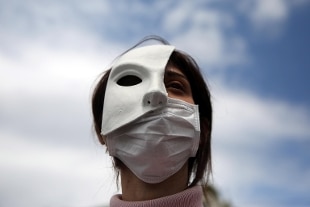- Coronavirus, WHO: is also an alarm for mental health
- Coronavirus, WHO: the virus may never disappear, with the vaccine we would have a chance
- WHO: fragile situation in Europe where fear and violence increase
Share
May 14, 2020 Mental health, not just physical health, is also at risk due to the coronavirus pandemic. The director of the mental health department of the World Health Organization, Devora Kestel, notes this by presenting a UN report on the subject."Isolation, fear, uncertainty, economic turmoil, all these elements cause or could cause psychological suffering", he added, considering that an increase in mental illness cases is likely, a matter that governments should put "in the foreground ".
The mental health and well-being of entire societies have been seriously affected by this crisis and are a priority 'to be addressed urgently, "the WHO official told reporters during a briefing.The UN report, with guidelines on covid-19 and mental illness, highlighted several areas of the world and parts of societies vulnerable to mental illness, including children and young people isolated from friends and school, health workers who see thousands of patients infected and dying from coronavirus.
Thus, according to the WHO analysis, the Covid-19 pandemic is likely to trigger "a massive increase in cases of mental illness in the coming months" if investment in mental health services is not increased urgently. "The impact of the pandemic on people's mental health is already extremely worrying," said the organization's director-general, Tedros Adhanom Ghebreyesus. "Social isolation, fear of contagion and loss of family members are compounded by the anguish caused by loss of income and often by unemployment."
Reports already indicate an increase in the symptoms of depression and anxiety in numerous countries. A study in Ethiopia in April reported a tripling of the presence of symptoms of depression compared to pre-Covid-19 estimates. "Specific population groups are particularly at risk of psychological stress related to Covid. Healthcare workers on the front line, in the face of heavy workloads, life or death decisions and the risk of contagion, are particularly affected", reads in the WHO report. During the pandemic, health workers in China reported high rates of depression (50%), anxiety (45%) and insomnia (34%) and in Canada 47% of health workers reported the need for psychological support.
" Children and adolescents are also at risk. Parents in Italy and Spain reported that their children had difficulty concentrating, as did irritability, restlessness and nervousness. Confinement measures resulted in greater risk for children who witness or experience violence and abuse. " Other risk groups are women , in particular those who juggle between smart working, home schooling and housework older people and people with pre-existing mental health conditions.
The increase in alcohol consumption is another area of concern for mental health experts. Statistics from Canada report that 20% of people between the ages of 15 and 49 have increased alcohol consumption during the pandemic. The increase in people in need of mental health or psychosocial support has been compounded by the discontinuation of physical and mental health services in many countries. In addition to the conversion of mental health facilities into care facilities for people with Covid-19, care systems have been affected by the closure of services and the shortage of staff.

